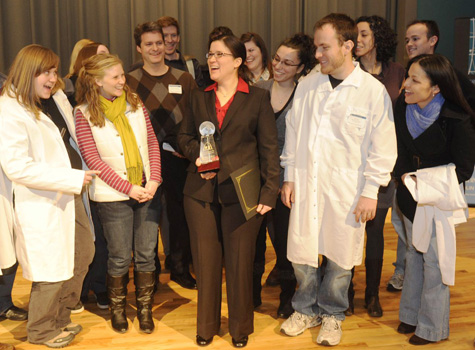
Mary Butkus
Morales (center, with trophy) celebrates with colleagues after winning the Olin Sustainability Case Competition Feb. 11 for her recommendation to set share electrical energy savings with researchers in labs that cut usage.
Maria Elena Morales, a doctoral student in neurosciences, proposed an incentive system that reduces electricity use in Washington University in St. Louis science laboratories to win the 2011 Olin Business School Sustainability Case Competition and $5,000 in prize money.
Three teams of finalists orally presented their recommendations Feb. 4 to a panel of judges on how to reduce the carbon footprint of the labs. As the winner, Morales will have the opportunity to present her case study to Chancellor Mark S. Wrighton and Henry S. Webber, executive vice chancellor for administration.
“I have worked in research labs since high school so I have an understanding of what goes on in labs on a daily basis,” Morales says. “I hope that this competition can initiate some real action towards improving sustainability.”
Morales recommended an incentive program that gives lab users half of the money saved on reduced energy consumption. She estimated that amount could be as much as $300 a month per lab, depending on its usage. A committee would need to be formed of students, researchers, faculty and staff to implement the program she called Energy-Nadirs.
“With increased education and a small incentive to change behavior, laboratory personnel can significantly impact the bottom line and reduce WU’s carbon footprint,” Morales says.
“It can be implemented almost immediately at relatively little cost, and can potentially have a very large impact,” she says, noting that 23 percent of the university’s energy use comes from research labs.
The second and third place teams will receive $2,000 and $1,000, respectively. They are:
- Second place: MBA students Ryan Spies, Steven Pedro and Jonathan Kaufman, and Sandor Kovacs, doctoral student in energy, environmental and chemical engineering.
- Third place: MBA students Philip Rozenski, Michael Naucas, Eric Seyfert, Lisa Taylor-Reinwald and Charles Leon.
“Their proposals were really creative and practical,” says Sharon Yoon, associate director of MBA student affairs and chair of the Olin Sustainability Case Competition Committee. “The greatest challenge is changing human behavior.”
Some of the other recommendations included: creating a named chair in energy savings, an energy raffle that allows students to bid on how much energy they could save annually, self-monitoring by researchers and providing scientists with a best practices model to follow.
This year, the second of the symposium, 21 teams comprising 83 students entered the competition representing all departments of the university.
“There was a good mix of students from every program,” Yoon says. “Unfortunately, no undergraduates advanced to the final round.”
Steve Hoffner, associate vice chancellor of operations, was one of the judges and also one of the campus administrators in a position to implement the students’ findings.
During last year’s inaugural competition seeking ways to make the university’s parking more environmentally friendly, several case recommendations were adopted in whole or part, Yoon says.
“It was a hodge podge of ideas from various teams,” she says.
Just as last year, audience members were entered into a raffle for attendance prizes. This year they included a 26-inch LCD TV with a built in DVD player, a Kindle reader and a Flip mini-HD camcorder.
Prizes were made possible by sponsors Edward Jones, Novis International and Sigma-Aldrich.